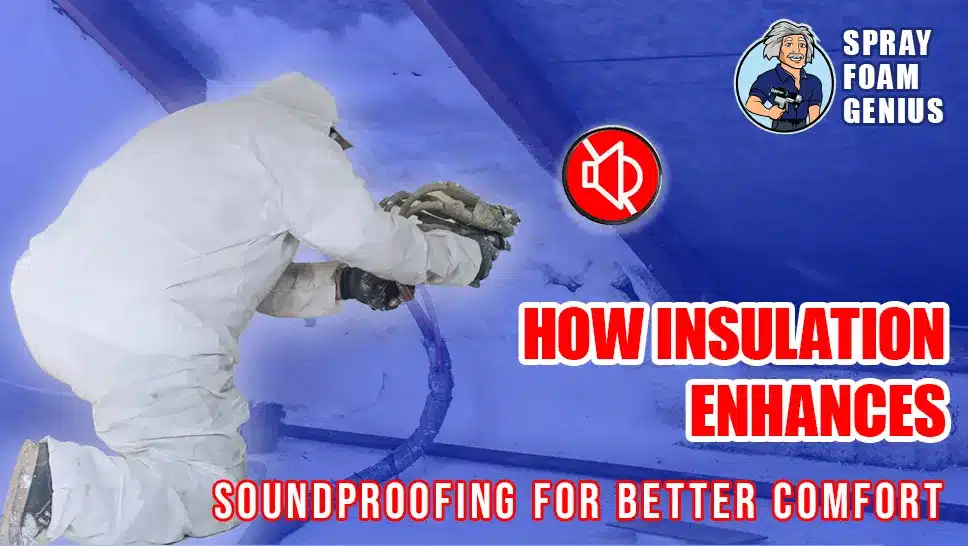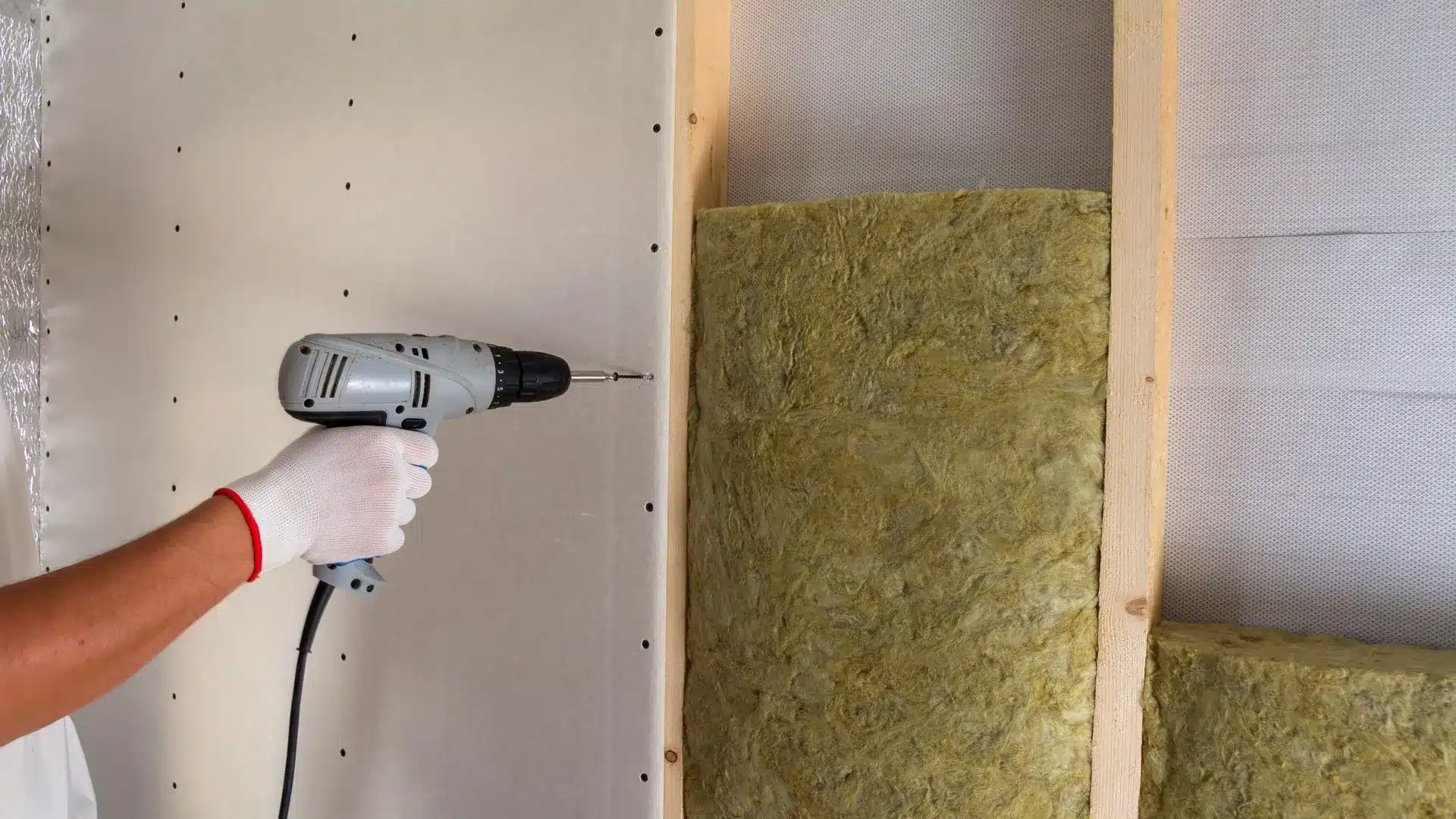
When you think about insulation, your mind might immediately jump to its role in energy efficiency—keeping your home warm in the winter and cool in the summer. However, insulation has another important function: soundproofing. At Spray Foam Genius Marketing, we help homeowners and businesses connect with expert spray foam insulation contractors who can enhance both the comfort and quietness of their spaces. In this detailed guide, we explore how insulation impacts soundproofing, offering practical advice on how to choose and install the right insulation to achieve a quieter, more peaceful environment.
Understanding the Basics: Insulation vs. Soundproofing
Before diving into the specifics of how insulation affects soundproofing, it’s essential to understand what soundproofing and insulation are, and how they differ.
Soundproofing refers to the measures taken to reduce the transmission of sound between spaces. This includes techniques and materials designed to block, absorb, or dampen sound waves, preventing them from passing through walls, ceilings, and floors.
Insulation, on the other hand, is primarily concerned with thermal resistance. Its main function is to prevent heat loss or gain by creating a barrier between different environments. While its primary purpose is not to block sound, the properties of insulation materials can significantly impact how well a space is soundproofed.
How Insulation Materials Affect Soundproofing
Different types of insulation materials offer varying degrees of soundproofing effectiveness. Here’s a closer look at how common insulation materials impact soundproofing:
1. Fiberglass Insulation
Fiberglass insulation is one of the most common types used in residential and commercial buildings. It consists of fine glass fibers that trap air, creating a thermal barrier. When it comes to soundproofing:
- Pros: Fiberglass insulation is effective at absorbing sound waves due to its fibrous structure, which helps reduce noise transmission within a space. It can help lower the noise levels of airborne sounds such as voices and music.
- Cons: While it provides some sound absorption, it is not as effective as other materials in blocking sound. It may not be sufficient for areas with high noise levels or rooms requiring significant soundproofing.
2. Spray Foam Insulation
Spray foam insulation, often used for its superior thermal performance, also plays a significant role in soundproofing. It expands upon application, filling gaps and creating an airtight seal.
- Pros: Spray foam insulation offers excellent soundproofing benefits due to its dense and expansive nature. It effectively blocks sound by creating a barrier that reduces sound transmission through walls, ceilings, and floors. Its ability to expand and fill every crevice helps minimize sound leakage.
- Cons: Spray foam insulation can be more expensive than other options, and professional installation is usually required. Additionally, once installed, it is not as easy to remove or replace as other types of insulation.
3. Cellulose Insulation
Cellulose insulation is made from recycled paper products and is known for its environmental benefits. It is often used as an alternative to fiberglass and foam.
- Pros: Cellulose is dense and has good sound absorption properties. It can effectively reduce both airborne and impact noises, making it a suitable choice for soundproofing applications. It is also treated with fire retardants, adding an extra layer of safety.
- Cons: Like fiberglass, cellulose is less effective at blocking sound compared to spray foam. It may settle over time, potentially reducing its effectiveness unless properly installed.
4. Mineral Wool (Rock Wool) Insulation
Mineral wool, also known as rock wool or slag wool, is made from natural rock or metal slag. It is praised for its soundproofing capabilities.
- Pros: Mineral wool has a high density and excellent sound absorption properties. It is highly effective at reducing both airborne and impact noise, making it ideal for spaces where soundproofing is a priority. It also offers good thermal insulation and fire resistance.
- Cons: Mineral wool can be more expensive than fiberglass or cellulose and may require more careful handling during installation due to its density and potential for irritation.
How Insulation Improves Soundproofing: The Science Behind It
1. Reducing Sound Transmission
Sound transmission occurs when sound waves travel through materials. Different insulation materials affect this process in various ways:
- Density: Heavier and denser materials, like mineral wool and cellulose, are better at blocking sound because they have more mass to absorb and reduce sound waves.
- Air Barrier: Materials like spray foam create an airtight seal, preventing sound from passing through gaps and cracks, which enhances their soundproofing capabilities.
- Absorption: Insulation materials with porous structures, like fiberglass and cellulose, absorb sound waves, reducing echoes and reverberations within a space.
2. Improving Acoustic Performance
Soundproofing is not just about blocking sound; it’s also about improving the acoustic quality of a room. Insulation can help achieve this by:
- Dampening Echoes: Insulation absorbs sound waves, which helps reduce echoes and reverberations, making spaces quieter and more comfortable.
- Enhancing Room Acoustics: Proper insulation can improve the overall acoustic environment of a room, making it more suitable for activities like conversation, music, or audio recording.
Installing Insulation for Optimal Soundproofing
1. Choosing the Right Insulation
To achieve the best soundproofing results, it’s essential to select insulation materials that match your specific needs:
- Assess Your Noise Sources: Determine the type of noise you need to address (airborne or impact) and choose materials accordingly.
- Consider Installation Areas: Different areas of your home or business may require different types of insulation. For example, walls, ceilings, and floors all have different soundproofing requirements.
2. Professional Installation
Proper installation is crucial for effective soundproofing. Here’s why professional installation matters:
- Accuracy: Professionals ensure that insulation is installed correctly, with no gaps or compression, which is essential for maximizing soundproofing benefits.
- Expertise: Experienced installers understand the nuances of different materials and can provide recommendations based on your specific needs.
- Long-Term Performance: Proper installation helps maintain the effectiveness of insulation over time, ensuring long-lasting soundproofing benefits.
3. Additional Soundproofing Measures
In some cases, combining insulation with other soundproofing techniques can enhance results:
- Acoustic Panels: Adding acoustic panels to walls or ceilings can further reduce sound reflections and improve room acoustics.
- Soundproof Drywall: Specialized drywall designed for soundproofing can be used in conjunction with insulation to enhance noise reduction.
- Sealing Gaps: Ensure that all gaps around windows, doors, and other openings are sealed to prevent sound leakage.
Benefits of Soundproofing with Insulation

1. Enhanced Privacy
- Residential: Improved soundproofing ensures that conversations and other activities remain private, reducing noise transmission between rooms and to the outside.
- Commercial: In office environments or commercial spaces, soundproofing promotes a quieter work environment, which can enhance productivity and reduce distractions.
2. Increased Comfort
- Noise Reduction: A quieter environment contributes to a more comfortable living or working space. It can also reduce stress and improve overall well-being.
- Temperature Control: Insulation helps maintain consistent indoor temperatures, complementing soundproofing efforts by creating a more controlled and comfortable atmosphere.
3. Improved Property Value
- Home Value: Homes with effective soundproofing are often more attractive to potential buyers, as they offer a quieter and more pleasant living experience.
- Commercial Appeal: For businesses, soundproofing can enhance the overall appeal of a property, making it more suitable for various purposes and potentially increasing its market value.
Making the Right Choice for Your Space
Choosing the right insulation for soundproofing involves evaluating your specific needs, budget, and the characteristics of your space. Here are some steps to help you make an informed decision:
1. Assess Your Needs
- Determine Noise Levels: Identify the sources of noise and the level of soundproofing required. High-noise areas may need more robust solutions.
- Evaluate Space Characteristics: Consider the type of space (residential or commercial) and its layout, as this can affect your choice of insulation and installation methods.
2. Consult with Professionals
- Get Expert Advice: Consult with insulation contractors to get recommendations based on your specific needs and space characteristics.
- Consider Installation Quality: Ensure that professionals are experienced and provide high-quality installation to achieve the best soundproofing results.
3. Budget Considerations
- Cost vs. Benefit: Weigh the cost of different insulation options against their soundproofing benefits. While some materials may be more expensive, they may offer greater long-term value and effectiveness.
Elevate Your Business Today!
At Spray Foam Genius Marketing, we understand the critical role that insulation plays in both energy efficiency and soundproofing. By selecting the right materials and ensuring proper installation, you can significantly enhance the soundproofing capabilities of your home or business. If you’re considering upgrading your insulation for better soundproofing, we are here to help you connect with expert spray foam insulation contractors who can provide tailored solutions to meet your needs.
Ready to improve your space’s soundproofing? Contact us today at 877-840-FOAM for USA and 844-741-FOAM for Canada, visit Spray Foam Genius Marketing, or email us at [email protected] for expert guidance and personalized recommendations.
- How to Use Pinterest to Market Your Spray Foam Insulation Services - December 27, 2023
- How to Use LinkedIn to Grow Your Spray Foam Insulation Business - December 23, 2023
- How to Use Instagram to Showcase Your Spray Foam Insulation Projects - December 16, 2023

